- Home
- Thomas H. Cook
Flesh and Blood Page 3
Flesh and Blood Read online
Page 3
“Leo Tannenbaum?”
“That sounds right,” Imalia said. “Do you know him?”
“We’ve had some contact,” Frank told her without elaborating. It had been a missing-person case. Kidnapping was suspected. Maybe murder. Frank had talked to a few people in Midtown North, Tannenbaum among them. A few weeks later the missing person had turned up again with a trunk full of souvenirs he’d bought in Honolulu.
“Anyway, that’s the name, I believe,” Imalia said. “We spoke a few times. He seemed to be in charge of everything. The whole investigation, I mean.”
“Sounds like he asked the usual questions.”
Imalia shrugged. “I suppose so,” she said. “But he kept looking at me like he hated me. Like he wanted to hurt me in some way.”
“Why would he want that?”
“I don’t know,” Imalia said quietly. “I really don’t.” She took a quick puff on the cigarette. “I told him that Hannah worked for me, but that I didn’t know her that well. What else could I say? It was the truth.”
“And so you couldn’t help them?”
“I don’t think so,” Imalia said. She shook her head. “I didn’t know much about Hannah’s personal life. She was an employee. I was her, well, her boss. You know what that is. You don’t always have any other kind of relationship.” She shrugged helplessly. “She’d worked for me for a long time. At this point, I only want her to have a decent burial. I think she deserves that.” She took a final drag on the cigarette, then snuffed it out in the small tin ashtray on Frank’s desk. “This really isn’t a personal thing,” she added, as her eyes shot up to him. “She wasn’t my surrogate mother or anything like that. She was a very valuable employee, and because of that, I don’t want the police to keep her body locked up in the morgue.”
“They may have their reasons. Miss Covallo,” Frank told her.
Imalia stared at him icily. “If they have such compelling reasons, then why won’t they tell me what they are?”
“I don’t know,” Frank admitted, “But I don’t think they’d hold on to it for no reason at all.”
“Perhaps,” Imalia said, as if giving in to his professional judgment. “But I have no confidence in the police, Mr. Clemons … Frank.” She looked at him closely. “May I call you Frank?”
He nodded.
Imalia smiled slightly. “As far as I know, they’ve made absolutely no progress in finding whoever it was who killed Hannah.”
“You haven’t given them much time.”
“Two weeks,” Imalia said with a sudden sharpness. “It’s disrupting everything.”
“Disrupting?”
“My life,” Imalia said. “The people who work for me, do you think they like being questioned? This has been going on for two weeks. How much longer will it take to put Hannah to rest?”
“Miss Covallo, if a murder isn’t solved in twenty-four hours, it may not be solved for years. It may never be solved.”
“Are you saying that you don’t want the job?” Imalia asked bluntly.
“No,” Frank said. “But if you wait a few more days, you might save yourself some money.”
“I don’t care about your fee, Mr. Clemons,” Imalia said softly. “I can afford it.” She glanced away from him, as if in an effort to control herself. “I just want Hannah to have a decent burial. That’s all I want.”
Frank closed the notebook. “All right,” he said. “I’ll do what I can.”
Imalia turned back toward him, and for a moment, an odd, pleading quality came into her face. Then, in an instant, she swept it out again and stared at him stiffly, Her head lifted slightly in an attitude of hard command. “I hope you can help me. Please try.”
“I can only let you know what I find out,” Frank replied firmly. “I can’t do more than that.”
“Money is no object.”
“That may be true,” Frank said, “but if you start spreading too much of it around, you’ll start buying lies.”
Imalia did not seem convinced. “I just want you to know that whatever it costs, I’ll pay it,” she said. Then she stood up and walked to the door.
“I’ll talk to Tannenbaum,” Frank called to her. “I’ll let you know what I find out.”
“I’d like to be able to reach you, too,” Imalia said. “When you’re not here, I suppose I can reach you at Karen’s?”
“Most of the time.”
“Anywhere else?” Imalia asked. She smiled tentatively. “Some private haunt?”
“I go to a little after-hours drinking place sometimes,” Frank told her reluctantly.
“Telephone number?” Imalia asked matter-of-factly.
“Not for this kind of place.”
Imalia’s eyes darted away from him shyly. “I guess I don’t know much about places like that,” she said, embarrassed.
“It’s at the corner of Tenth Avenue and Fiftieth Street,” Frank said. “Second floor. It’s open from two until dawn.”
“I’d only come in some sort of emergency,” Imalia assured him. Then she allowed her eyes to wander over his office once again, her head turning slowly to the left so that her face was caught suddenly in the dusky light. “This place,” she said, “it’s like a cave, like a room in the underworld.” Then she turned abruptly and walked away.
4
The large brick facade of the Midtown North precinct house sat in the middle of the street, huge and unmoving, like a gigantic red watchdog. Blue and white patrol cars lined the sidewalks left and right, along with several police scooters and an array of unmarked cars, usually dark blue or dark green, all of them bearing a police code on their license plates which identified them almost as clearly as their dusty, unwashed blackwall tires.
A long wooden desk stretched for nearly the entire width of the front room, and several people stood at various points along its length, some staring sourly at the bleak world which surrounded them, their hands cuffed behind their backs, their upper arms grasped loosely by the cops who stood next to them. To the right, a continuous stream of people moved in and out of the building, cops, witnesses, complainants, women with black eyes and broken arms, pimps, and gamblers in bright-colored jackets, chubby, middle-aged detectives who ponderously mounted the stairs toward the separate units of Vice, Narcotics, and Homicide.
To his right, Frank could see several wooden benches, and as he stood waiting to get the desk sergeant’s attention, he allowed his eyes to move over the people who occupied them. A skinny junkie nodded half-consciously at the far end of the bench, her pale, washed-out face slumping more and more deeply forward until she finally caught herself and jerked backward abruptly. An old woman sat next to her, obliviously riffling through a suitcase at her feet. It was filled with a thick pile of sodden magazines, and the woman was carefully going through them, slowly peeling back one page at a time. Down the line a well-dressed man stared vacantly toward the opposite wall. The collar of his shirt was torn, as well as the left knee of his trousers, and he looked as if the street mugging he’d just suffered had irrevocably changed the way he saw the world, invested it with a capacity of unimaginably sudden danger.
“Hello, Clemons.”
Frank turned toward the desk sergeant. His name was Calvino, and he ran the desk like a ringmaster, moving frantically from one knot of people to the next, answering the phone, screaming commands through the small brown speakers that hung here and there throughout the building.
“Is Tannenbaum in?” Frank asked.
“Yeah, upstairs.”
“He still working the Hannah Karlsberg case?”
“Far as I know,” Calvino said. His eyes scanned the scarred double doors of the precinct. Three men had just slammed through them, followed closely by three times as many cops.
“Shit,” Calvino hissed. “It’s a paper storm today.” His eyes shot over to Frank. “Upstairs,” he said hastily. “Tannenbaum’s up there somewhere.”
Frank made his way up the creaking wooden staircase which led to
the second floor. The railing had been smoothed down by the thousands of hands that had grasped it, and the steps sloped downward at the center. A steady stream of people had moved up and down this single staircase, and as he made his way toward the top, Frank could feel an odd kinship with all of them, not only the weary cops who had tramped up to their desks, but the people they’d pushed ahead of them or pulled up from behind, murderers and arsonists, drunks and thieves, that sea of felons whose murky depths, it seemed to him, knew no restraining tide, but whose disordered lives struck him as deeply interwoven with his own, part of some thin, tenuous connection which still drew him to the world.
Tannenbaum was sitting at his desk in the Homicide bullpen, a Daily News spread out before him. He wore an expensive jacket and shiny leather shoes, and because of them, Frank assumed that the Internal Affairs Division had been over his books more than once, found nothing, and so now assumed that he was simply one of those people who preferred a suit from Paul Stuart and shoes from Botticelli to a week in the Bahamas or a narrow little house on Staten Island.
“Hello, Leo,” Frank said as he stepped up to the desk.
Tannenbaum glanced up from his paper, then back down at it. “Did you read this, Frank? Last night in Queens, two cops shot each other. Lovers, can you believe it? Both of them married. God knows how many kids between them.” He looked at Frank. “It’s the sort of thing that makes my heart soar. What about you?”
Frank drew a chair over to Tannenbaum’s desk and sat down.
“A couple of weeks ago a woman was killed up on Seventy-sixth Street.” he said. “Her name was Hannah Karlsberg.”
“That’s right.”
“You still working that case?”
“Well, it’s way too early to close it, Frank.”
“Are you in charge of it?”
“More or less,” Tannenbaum said. “Why?”
“I’ve been asked to look into it,” Frank told him.
“Really?” Tannenbaum said. “Who asked you to do that?”
“A paying customer,” Frank said.
Tannenbaum laughed. “Come on, Frank, this isn’t television. Cops and PIs work together, you know that.” He smiled thinly. “Let’s face it, you can’t do much without us. At least not when we’re talking about murder.” He winked playfully. “But, hey, give the devil his due, you know. I mean, when it comes to catching some politico in his girlfriend’s undies, you guys have it all over us.”
Frank said nothing, and so Tannenbaum continued, happily shooting one finger after another into the air as he ticked off the singular disadvantages of a private investigator who chooses not to share his information with the police. “I love reminding you guys that you don’t have a crime lab. You don’t have a fingerprint file. You can’t do ballistics, run hair and fiber samples, or put so much as a fingernail clipping under the infrared. I hate to tell you, but you can’t swab a vagina for semen or trace the blood type of the freak who put it there. You can’t do soil chemistry, Frank, or footprint molds, or work up a composite of the human face.” He leaned forward. “Am I making my point?”
Frank stared at him expessionlessly.
“You can’t do autopsies, work up psychological profiles or look into anybody’s past by way of our computers,” Tannenbaum continued authoritatively. Then he stared evenly into Frank’s eyes. “So what it all adds up to is this: when it comes to a murder case, you need me a hell of a lot more than I need you.”
“Covallo,” Frank said. “Imalia Covallo.”
“She’s your client?”
“Yes.”
Tannenbaum smiled. “That what I figured.” He leaned back in his chair. “And so she figures you can collar the guy who killed Miss Karlsberg.”
“She only wants you to release the body,” Frank told him, “so the woman can have a decent burial.”
“Anything else?”
“No.”
“She’s not interested in who killed her?”
“She’s leaving that to you.”
Tannenbaum nodded. “Well, it’s understandable, her concern. About burying her friend, I mean. I don’t like keeping bodies in the cooler, myself. What else did she have to say?”
“Just what the police told her.”
“Which was?”
“That you didn’t want to release the body,” Frank said. “And that you didn’t have to unless a relative demanded it.”
“That’s the law, Frank,” Tannenbaum said. “Did she say anything else?”
“That Karlsberg was a loyal employee.”
“And she wants you to find a relative, right?”
“Yes.”
Tannenbaum shrugged. “Okay,” he said. “Maybe I can help you.” He took a manila folder from the top drawer of his desk and shoved it into his jacket pocket. “Come on, let’s go for a walk,” he said as he stood up briskly. “I could use a street-dog.”
Once outside the precinct house, Tannenbaum turned up toward Ninth Avenue, then headed north, toward Central Park.
“Precinct atmosphere’s beginning to get on my nerves, Frank,” he explained. “Did that ever happen to you?”
“All the time.”
“I can take the streets, but the cophouse is a sewer,” Tannenbaum added. “Was it like that in Atlanta?”
“It’s always like that, if you have a taste for working alone.”
Tannenbaum took a deep, relaxing breath. “When are you going to get rid of that hillbilly accent? I figured that’d be history by now.”
“Things cling,” Frank said.
“You should hear my brother-in-law,” Tannenbaum said. “Sounds just like a goddamn redneck.” He laughed. “He tells me you guys have a liquor down there named Rebel Yell. Is that true?”
“Yeah.”
“Can you get it up here?”
“Never tried.”
Tannenbaum looked at him seriously. “What, you don’t get sentimental about the old home place?”
Frank said nothing, and the two of them walked silently to Columbus Circle. Tannenbaum bought a frank from a street vendor, then strolled over to one of the benches at the edge of the park and sat down. He lifted the hot dog slightly before taking the first bite.
“I’d miss these,” he said.
Frank leaned back on the bench beside him. A young woman walked by quickly, then darted into the street. She reminded him of Karen’s sister, and for a moment he wanted to run after her, warn her, say the one thing he’d always wanted to say to his own daughter: Be whatever you like, but do not be a victim.
Tannenbaum took a sip from a can of soda, then carefully wiped the corners of his mouth with a napkin.
“I hear you live with a pretty classy woman,” he said.
Frank continued to watch the young woman as she threaded her way through the thickening traffic.
“Does she know Covallo?” Tannenbaum asked.
“Yes.”
“So this business between you and Covallo, it’s strictly professional?”
“Yes, it is,” Frank said coolly.
“Hey, I got to ask, Frank,” Tannenbaum said, almost apologetically. “If you’re going to be in on this case, I don’t want any secrets between us.”
“She came to me this morning,” Frank said. “She was at a party at Karen’s last night. I’d never seen her before. Does that satisfy you?”
“No problem, Frank, believe me,” Tannenbaum said. He took another bite of the hot dog and chewed it rapidly, his eyes darting right and left as he watched the street. “Nothing personal,” he added after he’d finished. “It’s just that I can’t let anybody burn my case. You were a cop, you know what I mean.” He took the manila folder from his pocket and offered it to Frank. “Here. Check this out. It’ll get you started.”
“What is it?”
“Lab report,” Tannenbaum said. “The basic stuff.”
“I’m not working the case, Leo,” Frank reminded him. “I’m just trying to get the body released.”
Tannenbaum continued to press the folder toward him. “Take it. When you’ve read it, you’ll know why we’re holding on to the corpse.”
Frank tucked the report under his arm. “Where’s the body?”
“Still in the cooler,” Tannenbaum said. “The problem is, we got a few wrinkles.”
“What kind?”
“It’s all in the report,” Tannenbaum said. “As far as the body, we’ll probably hold on to it for as long as we can.” He shrugged. “Unless you come up with some long-lost cousin.”
“What about children?” Frank asked immediately.
“No heir apparent of any kind,” Tannenbaum said. “Not even your friend Covallo could come up with a bloodline that was still pumping.”
Frank glanced at the flat manila envelope then back up at Tannenbaum. “What about pictures?” he asked. “In her apartment? People?”
Tannenbaum shook his head. “There were a few hanging on the wall. One with Imalia Covallo. It was taken midtown somewhere. And there were a few of Karlsberg herself, mostly travel stuff.”
“With anybody?”
“Alone. Probably got a local yokel to snap them for her.”
“How about phone numbers?”
“She had a few in a little book,” Tannenbaum said. “We called them all. Business associates of one kind or another. Your client was in it, and a few other people like her.”
Frank looked at him questioningly. “What do you mean, people like her?”
“People in the rag trade,” Tannenbaum explained. He looked at Frank evenly. “You know anything about the rag trade, Frank?”
The tenements of Cabbage Town swam into his mind, that small dilapidated village of clapboard flats that had bordered his old neighborhood in Atlanta, a world of sweat and dust and cheap beer that had squatted in the dark shadows of the adjoining textile factories for over a hundred years. He had sometimes glanced toward it as he sped by, seen the half-naked children playing in the weedy fields, or the old people swaying idly in their rotting swings, but he had never turned down one of its narrow, broken streets or hesitated for even the briefest moment as his car continued on.

 The Interrogation
The Interrogation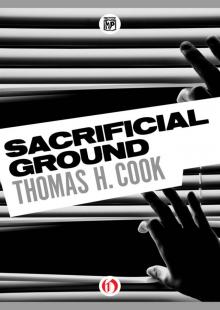 Sacrificial Ground
Sacrificial Ground The Fate of Katherine Carr
The Fate of Katherine Carr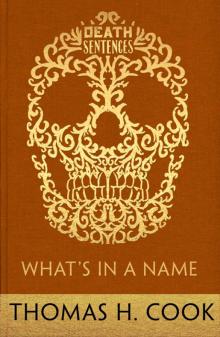 What's In A Name
What's In A Name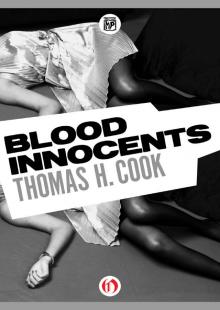 Blood Innocents
Blood Innocents Peril
Peril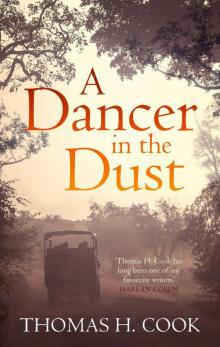 A Dancer In the Dust
A Dancer In the Dust Breakheart Hill
Breakheart Hill The Chatham School Affair
The Chatham School Affair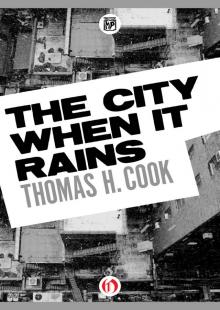 The City When It Rains
The City When It Rains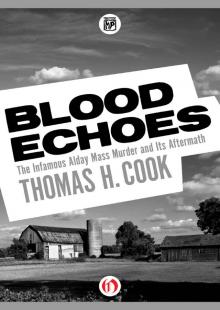 Blood Echoes
Blood Echoes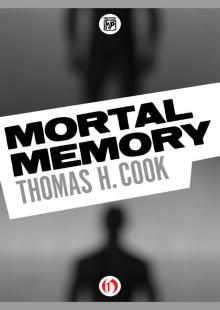 Mortal Memory
Mortal Memory Evidence of Blood
Evidence of Blood Into the Web
Into the Web The Crime of Julian Wells
The Crime of Julian Wells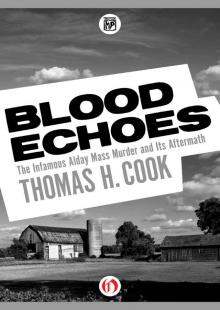 Blood Echoes: The Infamous Alday Mass Murder and Its Aftermath
Blood Echoes: The Infamous Alday Mass Murder and Its Aftermath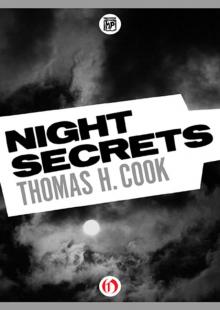 Night Secrets
Night Secrets Places in the Dark
Places in the Dark The Orchids
The Orchids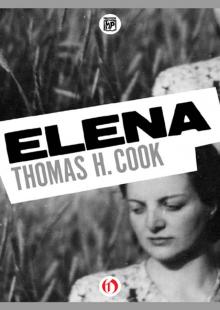 Elena
Elena Streets of Fire
Streets of Fire Instruments of Night
Instruments of Night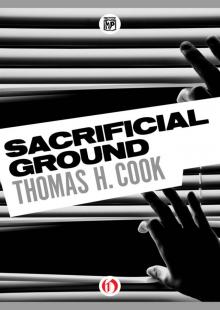 Sacrificial Ground fc-1
Sacrificial Ground fc-1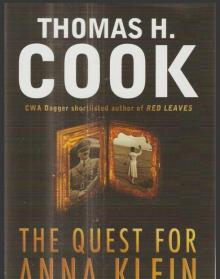 The Quest for Anna Klein
The Quest for Anna Klein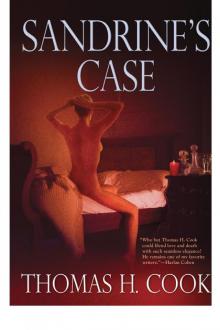 Sandrine's Case
Sandrine's Case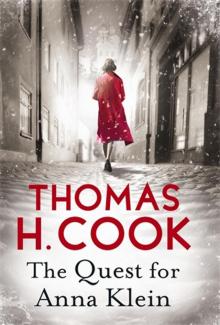 Quest for Anna Klein, The
Quest for Anna Klein, The Fatherhood
Fatherhood Flesh and Blood
Flesh and Blood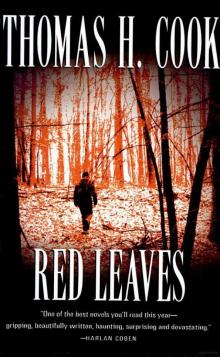 Red Leaves
Red Leaves